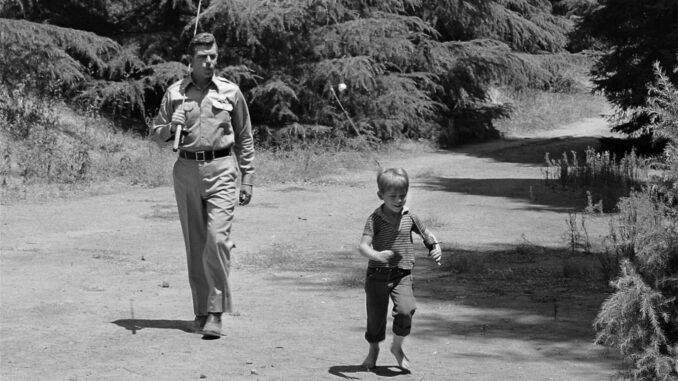
Step Into Mayberry with Andy and Opie Taylor
In a world increasingly defined by noise, speed, and the relentless churn of urgent headlines, there exists a quiet, comforting hum – a melody of simpler times that resonates deeply within the collective American consciousness. It’s the sound of crickets on a summer night, the creak of a porch swing, and the gentle strum of a guitar. It’s the irresistible invitation to “Step Into Mayberry,” a fictional small town that, through the lens of The Andy Griffith Show, became far more than a television setting; it became a symbol of idealized community, moral clarity, and the enduring power of a father’s love.
To step into Mayberry is to shed the cynicism of the modern age at its quaint, picket-fenced borders. Here, the gravest crime might be a goat eating dynamite or a misunderstanding over a fishing lure. The main street isn’t lined with sprawling malls or bustling traffic, but with Floyd’s Barbershop, the friendly gas station, and the county courthouse – the true heart of the town, presided over by Sheriff Andy Taylor. The air smells of Aunt Bee’s homemade biscuits and fresh-cut grass, and the pace of life slows to a gentle meander, dictated by the sunrise and sunset, not by appointments and deadlines. This is a place where every face is familiar, every story is known, and community isn't a concept to be studied, but the very fabric of daily existence.
At the center of this idyllic world are Andy Taylor and his young son, Opie. Their relationship isn't just the show's narrative spine; it’s its very soul, a masterclass in gentle parenting and quiet wisdom. Andy, with his relaxed demeanor and folksy charm, is no ordinary lawman. He doesn’t rely on a gun (which rarely leaves its holster, even when it’s there at all) or intimidation. Instead, his primary weapons are common sense, an uncanny ability to understand human nature, and a patient, knowing smile. Whether he’s mediating a petty squabble between neighbors, gently guiding the well-meaning but often bumbling Deputy Barney Fife, or, most importantly, instilling life lessons in Opie, Andy embodies a moral compass calibrated by kindness and empathy. He teaches by example, allowing Opie to make small mistakes and then guiding him back to the right path with a conversation, not a lecture.
Opie, with his bright red hair and ever-present fishing pole, is the perfect foil and beneficiary of Andy’s unique brand of fatherhood. He is the quintessential American boy: curious, occasionally mischievous, and always learning. We watch Opie grapple with universal childhood dilemmas – the temptation of a white lie, the sting of a broken promise, the challenge of doing the right thing when it’s hard. Through these everyday adventures, Andy doesn’t just tell Opie what to do; he illustrates the consequences, allowing Opie to experience the weight of his choices. From the poignant moment Opie must return all the birds he shot ("Opie the Birdman") to the time he learns the value of generosity over greed ("A Deal is a Deal"), their interactions are miniature morality plays, delivered with humor, warmth, and an unwavering foundation of love.
The enduring appeal of Mayberry lies not merely in its nostalgic charm, but in its quiet assertion of timeless values. It reminds us that problems can be solved with dialogue rather than conflict, that community thrives on mutual respect and genuine concern, and that the greatest victories are often found in the small, everyday acts of decency. It’s a place where simple pleasures – a fishing trip, a game of checkers on the porch, a shared meal – hold profound significance.
Stepping into Mayberry with Andy and Opie Taylor is an act of gentle rebellion against the complexities of modern life. It’s a reminder that wisdom can be found in simplicity, strength in kindness, and joy in connection. It’s a quiet whisper of what could be, a comforting echo of what we often long for: a world where the heart of a good man and the innocence of a growing boy can illuminate the path to a more civil, compassionate, and truly contented existence. And in that gentle hum, we find not just a television show, but a timeless, hopeful philosophy.